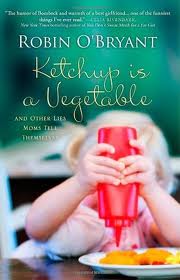
Ketchup is a Vegetable and Other Lies Moms Tell Themselves
Some of the best parenting advice I’ve gotten over the years has come from what Richmond Family Magazine refers to as “real moms” during playgroups, grocery stops, and happy hours. Therefore, I decided to blog about a different type of parenting book this month. In Ketchup is a Vegetable and Other Lies Moms Tell Themselves by Robin O’Bryant, she not only permits imperfection, but she embraces her own.
Dispersed throughout her entertaining narratives on birth control, breastfeeding, baby blues, and more, O’Bryant weaves words of wisdom into her stories that every mom can appreciate. For example, O’Bryant writes, “Unless you want your children to be completely stinking rotten, not only do you have to tell them ‘no’ on a regular basis, you have to mean it and you’ve got to be ready and willing to back it up.” She admits to having “occasionally pretended I couldn’t hear them so I could finish the task at hand, and dealt with their bad behavior after I was finished” and recognizes some may call her a lazy parent but she insists it’s all about priorities. Having ignored my fair share of trouble until I was finished with my own chores, I could relate.
It’s the same kind of selective hearing O’Bryant claims kids have mastered. She warns mothers, “Anything you say to another adult (especially regarding another adult) can be repeated verbatim by your children. Anything you say directly to your child must automatically be repeated –at least twice.” Like O’Bryant, I often find myself wondering if I spoke the words out loud or just thought them.
As a registered nurse, O’Bryant knew what post-partum depression was but she writes, “I was still ashamed to admit it,” fearing it made her a failure of a mother somehow. In the weeks following the birth of her first child, she felt horrible. Even though I never suffered from post-partum, I could relate when O’Bryant writes, “I didn’t want to hurt her or myself, but I couldn’t get out of my mind all of the horrible things that could happen to her.” When she finally sought help six weeks post baby, she claims, “I wish someone had slapped me silly and said, ‘GIRL, get you some drugs for a few months and you’ll be fine.’”
In the chapter, “Getting’ Your Fitness On,” she shares the amusing tale of working really hard to fit back into her clothes from high school only to have a fitness instructor saunter up to her and whisper with a wink, “Did I see a little baby bump?” When O’Bryant wonders if the woman was raised by wolves, I laughed out loud. Her reminder: Never ask a woman if she’s pregnant. O’Bryant continues, “For this and many reasons, I have purchased hand weights and an exercise ball to exercise at home when it’s too much trouble to leave the house.” Since, like O’Bryant, I only “like exercising once I’m leaving the gym with a smoothie in my hand,” the lesson wasn’t lost on me.
Ultimately, O’Bryant writes, “One of the hardest things I have discovered about being a mother is dividing my time between my husband and my children…When our first child was born it was like someone had dropped an atomic bomb in the middle of our little relationship utopia.” Despite date night’s importance, O’Bryant understand “they can also be expensive and a lot of trouble.” Love most often manifests itself in her house with small acts that mean a lot. “In exchange for staying up late with whichever child isn’t cooperating, he lets me sleep late every Saturday and Sunday, and has never complained about it.” Still, she admits to tense moments, such as when her husband insists on saying “Let’s only take what we really need” while packing for a roadtrip. “As if my thought process goes something like this, ‘We PROBABLY won’t need this, but we have SO much extra room in the car, I think I’ll just take it anyway.’” By the time O’Bryant questions “why you don’t see more mothers hitchhiking on the side of the road” because she’s seriously considered it, I know I’m in good company.
But the best parts of Ketchup is a Vegetable are the moments of reflection. “One thing I know for sure is that you can never appreciate the sacrifices that your own mother made for you until you are a mother yourself and realize what an ungrateful little jerk you were.” As she lists the ways mothers sacrifice for their children daily – skipping breakfast to make lunches, giving someone else last piece of pizza, or skipping coffee with a friend when her child isn’t feeling well – I’m glad to learn I’m not the only person who pictures “myself running to my room, locking my bedroom door and hiding under my bed to eat in peace.” But it’s her insights into parenthood that ring the most true, “A good mother can recognize when a sacrifice is only temporary.”
Let’s face it. At the end of the day, all we really need is someone who will empathize with our struggles, someone who will make us laugh when we feel like crying, and someone who gets why we’d invite the chaos into our lives all over again. It’s a tall order but one Ketchup can fill.
Follow @WinterhalterV on Twitter for updates on blog posts or like Parenting by the Book on Facebook.
Read my other blog Befriending Forty.






